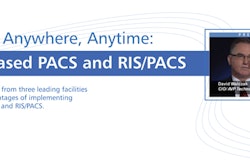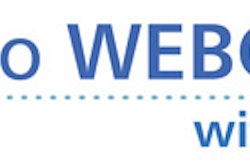The third National Health IT Week, held June 9-13 in Washington, DC, may have passed under the radar of the diagnostic imaging community, but a new nonprofit organization launched that week by the Healthcare Information and Management Systems Society (HIMSS) Foundation intends to change that next year.
One of the three mandates of the new Institute for e-Health Policy, currently headquartered in Arlington, VA, is to expand the activities and awareness of National Health IT Week to a national level, according to Neal Neuberger, its new executive director. Involvement by professional associations associated with diagnostic imaging informatics and "wired" hospitals and integrated delivery networks (IDNs) will be actively solicited.
The objective of National Health IT Week is to raise awareness among public and private decision-makers of the transformative power of health information technology. Its annual goal is to elevate national attention, especially to members of Congress, on the necessity of health IT adoption.
More than 25 members of Congress participated in this year's event, and sponsorship by professional healthcare-related organizations, healthcare vendors, state and federal agencies, research foundations, health insurance companies, and consumer protection groups increased to 76 this year, from 60 in 2007.
In an exclusive interview with AuntMinnie.com, Neuberger said that the scope of National Health IT Week has been constrained by a lack of staff to organize and promote it. "The resources of the Institute for e-Health Policy will change all this," he said.
"Of all physicians, radiologists have been in the forefront of adopting IT technology," according to Neuberger. "Teleradiology was one of the first viable examples to show the utility of e-health, especially in medically underserved communities."
"We were delighted to have one of our main events discuss the role of the IHE [Integrating the Healthcare Enterprise] in records interchangeability, and this initiative was implemented with the joint support of HIMSS and the RSNA," he said. "The institute will actively pursue involvement by organizations representing imaging informatics and diagnostic imaging -- radiology, cardiology, and pathology -- in National Health IT Week and in our other new initiatives."
The institute will take over the responsibility of sponsoring monthly luncheon briefings and demonstrations held on Capitol Hill for members of Congress and staff, Congressional committee staff, the Washington print and television press, federal agency staff, trade association members, and lobbyists from the Capitol Hill Steering Committee on Telehealth and Healthcare Informatics.
The steering committee, founded jointly in 1993 by North Dakota Senator Kent Conrad and Neuberger, has conducted over 120 luncheon forums on specific healthcare IT topics. These briefings were initiated as a way to educate and interest government policy makers in healthcare IT.
"In 1993, healthcare informatics was not a buzzword in Congress," Neuberger said. "The Capitol Hill Steering Committee's forums and demonstrations deliver education to the doorstep of the Capitol." Teleradiology, PACS, DICOM, and IHE have been diagnostic imaging related topics.
The institute also will support Congressional activities related to healthcare IT. "Policy decisions made in Washington, DC, have a tremendous impact on e-health initiatives across the nation," said Carla Smith, HIMSS executive vice president, announcing the kickoff of National Health IT Week. "These policy decisions often have a direct effect on whether or not healthcare organizations can correct health disparities using information technology in rural and underserved communities, enable workforces through technology training, and provide needed staffing and financial resources to e-health."
Emphasis will be placed on identifying solutions to resolve rural disparities as they relate to e-health. "There are all sorts of barriers that rural healthcare IT faces," Neuberger said. "Rural healthcare IT needs special consideration and support. Rural healthcare IT lacks financial resources, needs better trained IT professionals, and needs many more of them. Federal and state legislation can positively impact the effective implementation of healthcare IT in both rural healthcare and to medically underserved communities, such as the homebound elderly, in both rural and urban environments."
National Health IT Week's activities may have been limited to Washington, DC, this year, but the number and variety of events attended by legislators, federal agency staff, and healthcare IT influencers was substantial. And next year's event will be even bigger.
"Next year, through our partner sponsors, we expect that National Health IT Week activities will be national in scope, reaching constituencies like the diagnostic imaging communities," Neuberger said.
By Cynthia Keen
AuntMinnie.com staff writer
June 30, 2008
Copyright © 2008 AuntMinnie.com



















